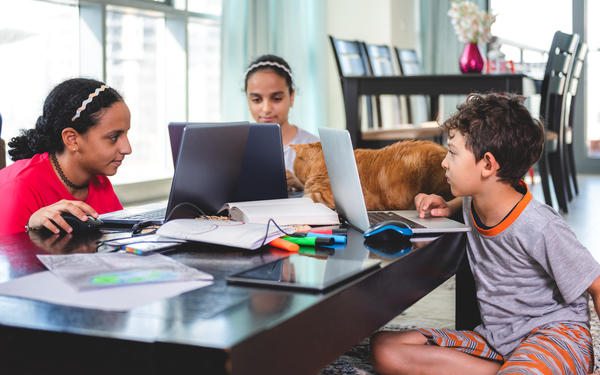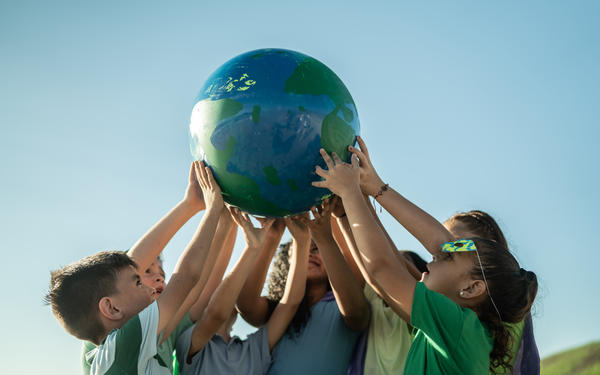Education to protect the planet: a Q&A with Cambridge's global director for climate education
Education can play a pivotal role in helping young people to understand and take action against climate change, helping us all to build a more sustainable future.
Cambridge Partnership for Education’s collaboration on a trailblazing new training course on carbon literacy for children in the United Arab Emirates (UAE) – the first course of its kind in the Middle East – is one demonstration of our commitment to helping our partners deliver appropriate climate education.
The course is the result of a partnership between Alef Education, the UAE's Ministry of Education, the Carbon Literacy Project, and Cambridge.
As we look ahead to the COP28 summit at the end of this month in Dubai, Christine Özden, Cambridge's global director for climate education, answers questions about the importance of climate education and carbon literacy and why the new UAE training course is such an important step.

Why is carbon education valuable?
It’s essential to give young people fundamental knowledge about the causes of climate change. They will develop some knowledge about this in geography and science classes, but it’s important to help them build on that knowledge and translate it into skills and action. Then, we need to show how this is all relevant to them, and what they can do to make a difference.
So, it's about giving young people an opportunity to take action and play their own part in tackling climate change - or to think critically about what their role should be.
That’s why the carbon literacy course we are partnering on in the UAE, the Alef EcoChamps Programme, is so important. It has already helped raise awareness of climate change and promote sustainable practices. It is educating students as young as 10 years old about the damage caused by carbon emissions and helping develop their understanding of local and global environmental issues.
How can we educate young learners on climate change?
Climate change education needs to be engaging and relevant so young people can identify with it. It needs to be hopeful and optimistic, rather than doom-laden. It’s about helping them be creative and find different ways to stop problems happening in the first place.
The Alef EcoChamps Programme does a really good job of engaging children. It’s all online and every section starts with a video, with engaging analogies that make complex facts very accessible. Topics are introduced by children who represent different segments of the UAE’s diverse population. Also, it’s available in both English and Arabic, to make it as accessible as possible.
One of the challenges in climate education or carbon literacy is that children may be taught something in the classroom and then they go home to families who have different values, behaviours or ways of thinking. But the UAE course makes that bridge between the classroom and home; it shows students how they can work together with their family to tackle climate issues.

There is evidence of growing anxiety about climate change. Does education have a role to play to alleviate this ‘eco-anxiety’?
Eco anxiety, or climate distress, is real and we need to acknowledge it.
We’ve done some work with climate psychologists about this, and their advice was to avoid putting expectations on children, to avoid making it their responsibility. Instead, we should work on how to give them the ability to act, without simply telling them it’s their problem to solve as the next generation.
Schools have a crucial role as part of their duty of care for children. They need to take climate education and carbon literacy seriously, because it is having an impact on young people’s wellbeing, and we need to support school leaders and teachers to do so.
How much of a problem is misinformation in climate education?
Being able to deal with diverse viewpoints and misinformation is really important when dealing with big global issues such as climate change.
False or misleading information online, and low-quality climate change education, make it harder for children and young people to distinguish between fact and fiction.
We need to build students’ critical skills. So, when they see or are exposed to information, they are able to critically evaluate it.
Is there a global trend towards greater education on climate change?
There is increased interest in climate related literacy and education. In countries and regions where there is an urgent need to reduce emissions, the focus will be on education for individual and collective action. Whereas, in regions and countries that are more vulnerable to climate impacts, the focus may be more on education around adapting to the consequences of climate change.
That’s not to say that climate education is widely recognised as important across our curricula yet. That’s why the UAE’s new course represents such a vital step - it’s the first of its kind for Middle East schools. It’s blazing a path for youth engagement and education on climate change issues.
Climate education will be an essential topic at the upcoming COP28 in Dubai, where the Ministry of Education’s Greening Education Pavilion will drive forward global collaboration to improve children’s climate literacy – we’ll see you there!
If you’d like to find out more about how Cambridge Partnership for Education can support climate education in your education system, please get in touch.
